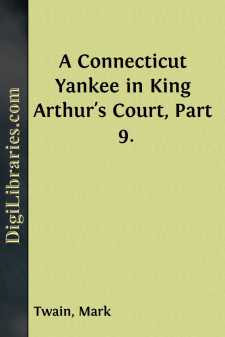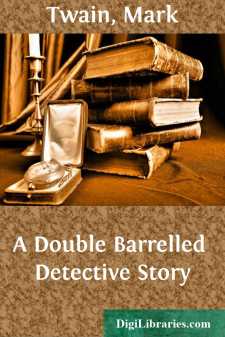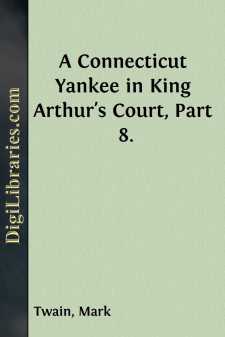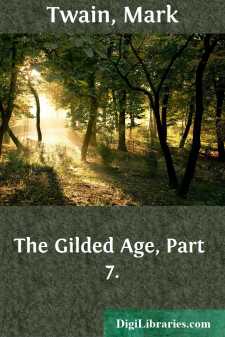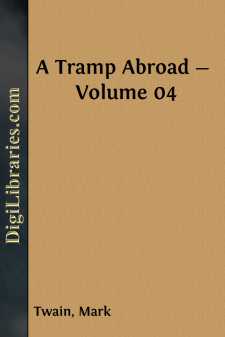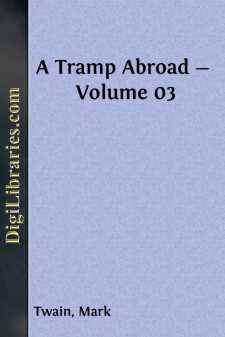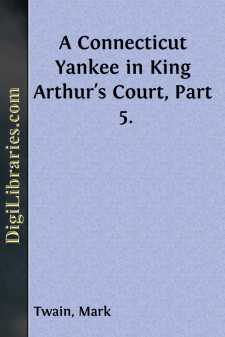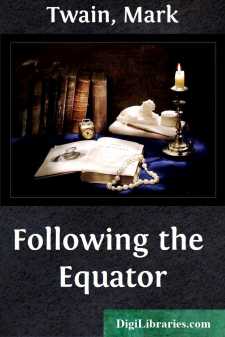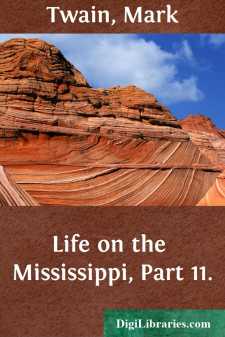Categories
- Antiques & Collectibles 13
- Architecture 36
- Art 48
- Bibles 22
- Biography & Autobiography 813
- Body, Mind & Spirit 142
- Business & Economics 28
- Children's Books 15
- Children's Fiction 12
- Computers 4
- Cooking 94
- Crafts & Hobbies 4
- Drama 346
- Education 46
- Family & Relationships 57
- Fiction 11828
- Games 19
- Gardening 17
- Health & Fitness 34
- History 1377
- House & Home 1
- Humor 147
- Juvenile Fiction 1873
- Juvenile Nonfiction 202
- Language Arts & Disciplines 88
- Law 16
- Literary Collections 686
- Literary Criticism 179
- Mathematics 13
- Medical 41
- Music 40
- Nature 179
- Non-Classifiable 1768
- Performing Arts 7
- Periodicals 1453
- Philosophy 64
- Photography 2
- Poetry 896
- Political Science 203
- Psychology 42
- Reference 154
- Religion 513
- Science 126
- Self-Help 84
- Social Science 81
- Sports & Recreation 34
- Study Aids 3
- Technology & Engineering 59
- Transportation 23
- Travel 463
- True Crime 29
The Gilded Age, Part 2.
by: Mark Twain
Description:
Excerpt
CHAPTER X.
Only two or three days had elapsed since the funeral, when something happened which was to change the drift of Laura's life somewhat, and influence in a greater or lesser degree the formation of her character.
Major Lackland had once been a man of note in the State—a man of extraordinary natural ability and as extraordinary learning. He had been universally trusted and honored in his day, but had finally, fallen into misfortune; while serving his third term in Congress, and while upon the point of being elevated to the Senate—which was considered the summit of earthly aggrandizement in those days—he had yielded to temptation, when in distress for money wherewith to save his estate; and sold his vote. His crime was discovered, and his fall followed instantly. Nothing could reinstate him in the confidence of the people, his ruin was irretrievable—his disgrace complete. All doors were closed against him, all men avoided him. After years of skulking retirement and dissipation, death had relieved him of his troubles at last, and his funeral followed close upon that of Mr. Hawkins. He died as he had latterly lived—wholly alone and friendless. He had no relatives—or if he had they did not acknowledge him. The coroner's jury found certain memoranda upon his body and about the premises which revealed a fact not suspected by the villagers before-viz., that Laura was not the child of Mr. and Mrs. Hawkins.
The gossips were soon at work. They were but little hampered by the fact that the memoranda referred to betrayed nothing but the bare circumstance that Laura's real parents were unknown, and stopped there. So far from being hampered by this, the gossips seemed to gain all the more freedom from it. They supplied all the missing information themselves, they filled up all the blanks. The town soon teemed with histories of Laura's origin and secret history, no two versions precisely alike, but all elaborate, exhaustive, mysterious and interesting, and all agreeing in one vital particular-to-wit, that there was a suspicious cloud about her birth, not to say a disreputable one.
Laura began to encounter cold looks, averted eyes and peculiar nods and gestures which perplexed her beyond measure; but presently the pervading gossip found its way to her, and she understood them—then. Her pride was stung. She was astonished, and at first incredulous. She was about to ask her mother if there was any truth in these reports, but upon second thought held her peace. She soon gathered that Major Lackland's memoranda seemed to refer to letters which had passed between himself and Judge Hawkins. She shaped her course without difficulty the day that that hint reached her.
That night she sat in her room till all was still, and then she stole into the garret and began a search. She rummaged long among boxes of musty papers relating to business matters of no, interest to her, but at last she found several bundles of letters. One bundle was marked "private," and in that she found what she wanted. She selected six or eight letters from the package and began to devour their contents, heedless of the cold.
By the dates, these letters were from five to seven years old. They were all from Major Lackland to Mr. Hawkins. The substance of them was, that some one in the east had been inquiring of Major Lackland about a lost child and its parents, and that it was conjectured that the child might be Laura.
Evidently some of the letters were missing, for the name of the inquirer was not mentioned; there was a casual reference to "this handsome-featured aristocratic gentleman," as if the reader and the writer were accustomed to speak of him and knew who was meant.
In one letter the Major said he agreed with Mr. Hawkins that the inquirer seemed not altogether on the wrong track; but he also agreed that it would be best to keep quiet until more convincing developments were forthcoming.
Another letter said that "the poor soul broke completely down when be saw Laura's picture, and declared it must be she."
Still another said:
"He seems entirely alone in the world, and his heart is so wrapped up in this thing that I believe that if it proved a false hope, it would kill him; I have persuaded him to wait a little while and go west when I go."Another letter had this paragraph in it:
"He is better one day and worse the next, and is out of his mind a good deal of the time. Lately his case has developed a something which is a wonder to the hired nurses, but which will not be much of a marvel to you if you have read medical philosophy much. It is this: his lost memory returns to him when he is delirious, and goes away again when he is himself-just as old Canada Joe used to talk the French patois of his boyhood in the delirium of typhus fever, though he could not do it when his mind was clear. Now this poor gentleman's memory has always broken down before he reached the explosion of the steamer; he could only remember starting up the river with his wife and child, and he had an idea that there was a race, but he was not certain; he could not name the boat he was on; there was a dead blank of a month or more that supplied not an item to his recollection. It was not for me to assist him, of course. But now in his delirium it all comes out: the names of the boats, every incident of the explosion, and likewise the details of his astonishing escape—that is, up to where, just as a yawl-boat was approaching him (he was clinging to the starboard wheel of the burning wreck at the time), a falling timber struck him on the head. But I will write out his wonderful escape in full to-morrow or next day. Of course the physicians will not let me tell him now that our Laura is indeed his child—that must come later, when his health is thoroughly restored. His case is not considered dangerous at all; he will recover presently, the doctors say. But they insist that he must travel a little when he gets well—they recommend a short sea voyage, and they say he can be persuaded to try it if we continue to keep him in ignorance and promise to let him see L. as soon as he returns."The letter that bore the latest date of all, contained this clause:
"It is the most unaccountable thing in the world; the mystery remains as impenetrable as ever; I have hunted high and low for him, and inquired of everybody, but in vain; all trace of him ends at that hotel in New York; I never have seen or heard of him since, up to this day; he could hardly have sailed, for his name does not appear upon the books of any shipping office in New York or Boston or Baltimore....


